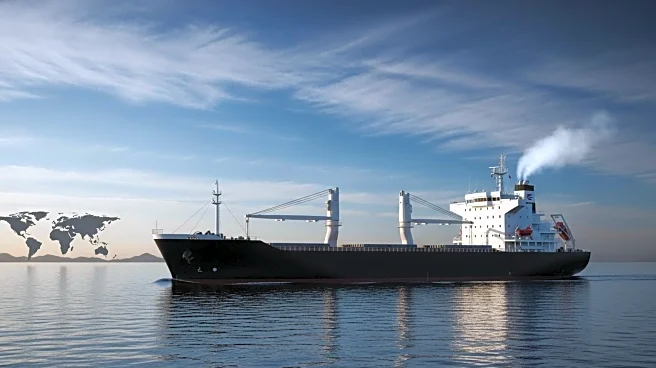What's Happening?
The International Maritime Organization (IMO) is set to meet this week to decide on the imposition of a carbon emissions price on global shipping. This proposal is backed by an EU-led bloc, including Britain, China, and Japan, but faces strong opposition from the United States. The preliminary deal, struck in April, aims to charge the global shipping industry for emissions. The U.S. withdrew from the associated talks and has since threatened reciprocal measures against any fees imposed on U.S. ships. The IMO's environmental committee is scheduled to meet from October 14-17 to discuss the adoption of this measure, which would impose fees on ships exceeding emissions thresholds and reward those using cleaner fuels. Revenues from the measure would be collected by an IMO Net-Zero Fund, although details of revenue distribution remain undecided.
Why It's Important?
The potential adoption of the IMO's carbon emissions levy could significantly impact international shipping and trade relations. If implemented, the measure would generate substantial revenue, estimated at $11 billion to $12 billion annually between 2028 and 2030. This could incentivize cleaner fuel usage in the shipping industry, contributing to global climate goals. However, the U.S. opposition highlights geopolitical tensions, as Washington views the measure as a European-led export of climate regulations. The U.S. has threatened to impose port fees and visa restrictions against supporting countries, indicating potential trade conflicts. The outcome of the IMO meeting could influence global shipping practices and international relations, particularly between the U.S. and EU.
What's Next?
The IMO's environmental committee will convene to discuss the adoption of the carbon emissions levy. If approved, the measure will be implemented, affecting ships larger than 5,000 tons. The U.S. may respond with retaliatory measures, such as port fees and visa restrictions, against countries supporting the levy. The decision could lead to further diplomatic negotiations or conflicts between the U.S. and EU. Stakeholders in the shipping industry will need to prepare for potential changes in operational costs and regulatory compliance. The development of the IMO Net-Zero Fund and its revenue distribution will also be closely monitored by industry and government entities.
Beyond the Headlines
The proposed carbon emissions levy by the IMO could have broader implications for international environmental policy and economic dynamics. It represents a shift towards integrating environmental considerations into global trade practices, potentially setting a precedent for other industries. The measure could encourage technological advancements in cleaner fuel alternatives and emissions reduction strategies. Additionally, the geopolitical tensions arising from the U.S. opposition may influence future international climate agreements and collaborations. The situation underscores the complexities of balancing environmental goals with economic interests and international relations.









